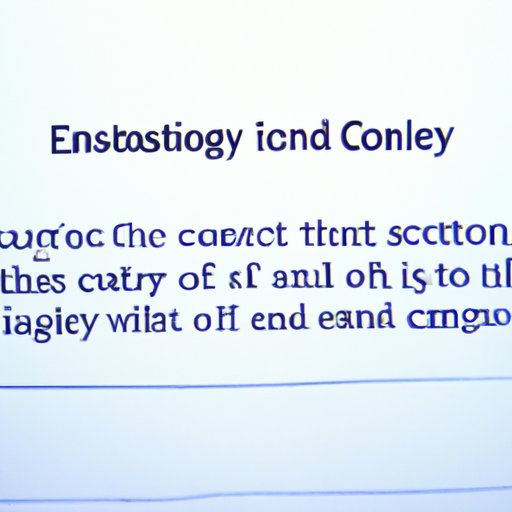Introduction
The conclusion of an essay is where you tie together all of your main points and reinforce your thesis statement. It’s also a great opportunity to leave a lasting impression on your reader. A strong conclusion can make the difference between an average essay and an exceptional one. However, crafting a good conclusion can be a challenge for many students. This article will explore some effective strategies for starting a conclusion in an essay.
Summarize Your Main Points
The first step to starting a conclusion in an essay is to review the main points of your essay. You want to remind your reader of the key points that you have discussed throughout your essay. This can be done through a concise summary of each point. For example, if you are writing an essay about the benefits of getting a college education, you could summarize your main points like this: “A college education can provide a variety of opportunities, including career advancement, financial security, and personal growth.”
Restate Your Thesis Statement
The next step to starting a conclusion in an essay is to restate your thesis statement. This serves as a reminder to your reader of the main argument of your essay. It also emphasizes the importance of the thesis statement, which should be the focus of your entire essay. Make sure to restate your thesis in a new and interesting way. For example, if your thesis statement was “Getting a college education is beneficial for many reasons,” you could restate it as “A college education can open up a world of opportunities for those willing to take advantage of them.”

Offer Solutions or Suggestions for Further Discussion
The next step to starting a conclusion in an essay is to offer solutions or suggestions for further discussion. This is a great opportunity to discuss potential solutions to any problems raised in the essay. Additionally, you can talk about possible areas for further exploration. For example, if you are writing an essay about the environmental impact of plastic pollution, you could suggest possible solutions like transitioning to reusable materials or creating more efficient recycling systems. You could also suggest further research into the effects of plastic pollution on different ecosystems.

End With a Final Thought or Quote
Another great way to start a conclusion in an essay is to end with a final thought or quote. This serves as a powerful way to leave a lasting impression on your reader. Choose a thought-provoking quote or statement that resonates with the essay topic. For example, if you are writing an essay about the importance of self-reflection, you could end with a quote from philosopher Socrates: “The unexamined life is not worth living.”
Make a Bold Statement
Another effective strategy for starting a conclusion in an essay is to make a bold statement. This should be a statement that will resonate with the reader and make them think. Make sure that the statement is relevant to the essay topic. For example, if you are writing an essay about the power of forgiveness, you could make a bold statement like “Forgiveness can be the strongest force in healing our world.”
Leave the Reader With Something to Think About
One final way to start a conclusion in an essay is to leave the reader with something to think about. This can be done by asking a thought-provoking question or posing a challenge to the reader. For example, if you are writing an essay about the importance of taking responsibility for your actions, you could ask the reader “What will you do to take responsibility for your actions today?”
Conclusion
In conclusion, crafting a strong conclusion for an essay is an important skill for any student. Taking the time to understand the main points of your essay and how to effectively summarize them can make all the difference. Additionally, using strategies such as restating your thesis statement, offering solutions or suggestions for further discussion, ending with a final thought or quote, making a bold statement, and leaving the reader with something to think about can help ensure that your conclusion is both memorable and effective.
(Note: Is this article not meeting your expectations? Do you have knowledge or insights to share? Unlock new opportunities and expand your reach by joining our authors team. Click Registration to join us and share your expertise with our readers.)
